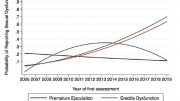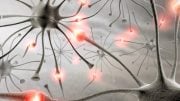
Premature ejaculation (PE) is a common sexual dysfunction that affects many men. It is characterized by the inability to control or delay ejaculation during sexual intercourse, leading to an unsatisfactory sexual experience for both partners. PE can cause significant distress and can have a negative impact on a man’s self-esteem and relationships. While the exact cause of PE is not well understood, it is thought to be a combination of psychological and physiological factors.
A recent study has discovered promising non-pharmacological outcomes for premature ejaculation.
A new peer-reviewed study conducted by Anglia Ruskin University (ARU) suggests that exercise may be a potentially effective approach to treating premature ejaculation.
The recent study published in Trends in Urology and Men’s Health analyzed 54 studies from around the world, involving 3,485 participants, to explore the potential of exercise as a treatment for premature ejaculation. The research team reviewed studies published over the past 49 years. Premature ejaculation affects a significant portion of men, with estimates ranging from 30% to 83% due to the absence of a universally accepted definition, which presents challenges for study design.
The condition has few pharmacological treatments. The drug dapoxetine is approved for use outside of the USA, while other off-label options often used include local anesthetics, clomipramine, and tramadol. Many of these interventions have side effects. The ARU study examined non-pharmacological interventions and their increase in latency time, which is the time taken to ejaculate.
Researchers found that physical activity as an intervention had promising results in many of the studies, proving as effective as drugs but without associated side effects. One study included in the review found that running for 30 minutes, five times a week had as much effect on latency time as taking dapoxetine.
Another study included in the research suggested that carrying out pelvic floor exercises increased latency time from a median of one minute to three minutes.
The research also looked at approaches using various forms of psychotherapy, and studies showed generally positive results in increasing latency time.
Senior author Lee Smith, Professor of Public Health at Anglia Ruskin University (ARU), said: “We know premature ejaculation is a common complaint among men worldwide. The lack of a clear definition of what is or isn’t premature ejaculation has repercussions in terms of treatment, and there are relatively few effective drugs available. Our paper is a comprehensive review of studies into non-pharmacological interventions for this common complaint, and there are clear indications that physical exercise, including running and engaging the pelvic floor muscles, show promise in several studies. Given that drugs often have side effects, it appears that after all, the best medicine for avoiding premature ejaculation may well lie in exercise, and this possibility requires larger studies and further investigation.”
Reference: “Non-pharmacological approaches for treatment of premature ejaculation: a systematic review” by Damiano Pizzol, Guillermo F López Sánchez, Petre Cristian Ilie, Alessandro Bertoldo, Mike Trott, Mark A Tully, Jason J Wilson, Nicola Veronese, Pinar Soysal, Anne Carrie, Simona Ippoliti, Luke Pratsides, Sam Shah, Ai Koyanagi, Laurie Butler, Yvonne Barnett, Christopher Parris, Rosie Lindsay and Lee Smith, 22 February 2023, Trends in Urology & Men’s Health.
DOI: 10.1002/tre.903









Weed is the better answer.
I truly think ejaculating quickly is natural and in line with other mammals and primates.
If 83% of people think they bust too early, it may be an upside down society that suggests we should be cumming too late.